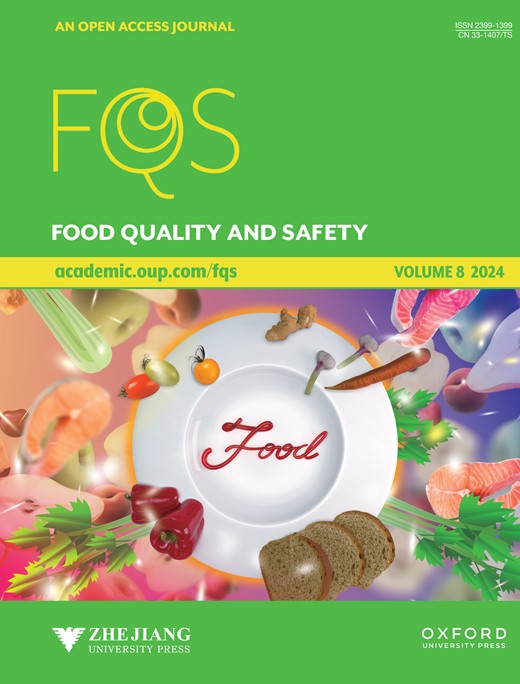花青素处理通过调节脱落酸和花青素合成过程来延缓蓝莓果实的衰老
IF 4.4
3区 农林科学
Q2 FOOD SCIENCE & TECHNOLOGY
引用次数: 0
摘要
摘要目的研究外源花青素处理对蓝莓果实采后室温贮藏过程中脱落酸(ABA)和花青素合成的一般影响。材料与方法用3.0 g L−1花青素处理新鲜蓝莓果实,室温保存,研究处理对果实硬度和营养品质的影响。测定果实硬度、ABA含量、花青素含量及关键基因的相对表达量。结果花青素处理通过抑制与ABA合成有关的VcNCED1基因的表达而降低了ABA水平。同时,通过促进花青素生物合成基因VcC4H、VcF3H、VcF3’5’h、VcANS和VcAT的表达,提高了内源花青素含量。结论采后花青素处理通过抑制果实软化和活性氧积累,促进内源花青素合成,抑制内源ABA积累,延缓蓝莓衰老。本文章由计算机程序翻译,如有差异,请以英文原文为准。
Anthocyanins treatment delays the senescence of blueberry fruit by regulating abscisic acid and anthocyanin synthesis processes
Abstract Objectives The purpose of this work was to examine the general effects of exogenous anthocyanins treatment on the synthesis of abscisic acid (ABA) and anthocyanin in blueberry fruit during postharvest storage under room temperature conditions. Materials and Methods Fresh blueberry fruit were treated with 3.0 g L−1 anthocyanins and stored at room temperature to investigate the effects of the treatment on fruit firmness and nutritional quality. The fruit firmness, ABA content, anthocyanin content and the relative expression levels of key genes were evaluated. Results The results demonstrated that anthocyanins treatment decreased the ABA level by inhibiting the expression of the VcNCED1 gene implicated in ABA synthesis. At the same time, the treatment increased the content of endogenous anthocyanin by promoting the expression of anthocyanin biosynthesis genes such as VcC4H, VcF3H, VcF3’5’H, VcANS, and VcAT. Conclusions Postharvest anthocyanins treatment promoted the synthesis of endogenous anthocyanin and inhibits the accumulation of endogenous ABA, delayed the senescence of blueberries by inhibiting fruit softening and the accumulation of active oxygen.
求助全文
通过发布文献求助,成功后即可免费获取论文全文。
去求助
来源期刊

Food Quality and Safety
FOOD SCIENCE & TECHNOLOGY-
CiteScore
7.20
自引率
1.80%
发文量
31
审稿时长
5 weeks
期刊介绍:
Food quality and safety are the main targets of investigation in food production. Therefore, reliable paths to detect, identify, quantify, characterize and monitor quality and safety issues occurring in food are of great interest.
Food Quality and Safety is an open access, international, peer-reviewed journal providing a platform to highlight emerging and innovative science and technology in the agro-food field, publishing up-to-date research in the areas of food quality and safety, food nutrition and human health. It promotes food and health equity which will consequently promote public health and combat diseases.
The journal is an effective channel of communication between food scientists, nutritionists, public health professionals, food producers, food marketers, policy makers, governmental and non-governmental agencies, and others concerned with the food safety, nutrition and public health dimensions.
The journal accepts original research articles, review papers, technical reports, case studies, conference reports, and book reviews articles.
 求助内容:
求助内容: 应助结果提醒方式:
应助结果提醒方式:


